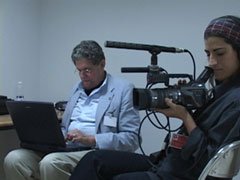
Doha: There are more important TV news broadcasters based in the Dubai/Abu Dhabi sector of my quick Gulf tour (Al Arabiya, Abu Dhabi TV, Dubai Business Channel, MBC News) than in Qatar but the dynamic is all here in that curious triangle of Al Jazeera, the Coalition Central Command headquarters (Centcom), and the dozens of TV newsmen covering the daily Centcom briefings. It was Jehane Nujaim, the amazing Egyptian-American documentary film maker, whose first venture "Startup.com" was such an extraordinary success (go to Google and read the glowing reviews in New Yorker, Vanity Fair, The New York Times, Vogue, Rolling Stones, and the Director's Guild award she received) who called my attention to that curious dynamic or field of force when I had suggested she might leave Doha and also visit Al Arabiya in Dubai and nearby Abu Dhabi TV. She had come out to the region right after Startup.com had premiered in Spain to do something about this war and above all about the coverage, sensing as did the New Yorker and so many other publications that this war was as much about television and its role in reporting on war and making war, as it was about weapons of mass destruction, taking care of unfinished business (the 1991 betrayal of a popular Iraqi uprising), ending an oppressive regime, making a grab for Iraqi oil, or serving Sharon's interests, or any combination of the above, depending on your political persuasion.
What makes the Doha field of force even more pronounced is the curious contrast to the mood, outside this Electronic Triangle, in those parts of the Gulf, including Doha, where I touched down. So much of the population of Dubai, Qatar, and Abu Dhabi is expatriate-and a high percentage of that non-Arab, largely Indian subcontinent and British-that the war seems to be barely of concern out on the streets. None of that Cairo, or even more so, Amman street tension, as if everyone is waiting for the next demonstration and conceivable riot and unrest. If there is a concern outside of the Electronic Triangle it is about commercial implications-less travel, empty hotels except for the local expatriate special weekend trade at the more spectacular seaside/poolside hotels. This is particularly the case in Dubai where the non-Arab expatriate population is almost overwhelming. Yet within the force field-with the foreign correspondents at Centcom, at Al Jazeera (and by metaphorical extension, in the news centers at Al Arabiya in Dubai and ADTV in Abu Dhabi), the mood is adrenalin-enhanced war fever.
It's the first week of the war and everything about it seems exaggerated; not just what sounds like claims of captured southern cities in which resistance continued for days afterwards-later a very sympathetic military spokesman explained that what I took for exaggeration had to do with nomenclature: that "secured" didn't mean "safe" (see Interview with Lieut. Rushing) but even the earliest descriptions coming out of Centcom's briefing room reeked of exaggeration. The only exception was the briefing room itself-the Hollywood set supposedly designed in the states and flown in at high cost-which was smart, effective, and functional but didn't seem as far over the top as had been reported.
It was as if this war was being fought in a vacuum without any sense of context or history. That was understandable when it came from the Iraqis: they had every reason to exaggerate the impact of the bombings, and the access they provided for shots of terribly burned or maimed children were accompanied by claims that the Coalition was intentionally targeting civilians. Understandable-they were after all doing all that they could do to stoke the fire of an all pervasive anger in the Arab world and in the West among anti-war elements in the hope that such anger would translate into an unrest, or even civic uprisings, that would some how buy the Baathist regime a ceasefire and a reprieve.
And while the Coalition spokesmen here soldiered on, denying quite reasonably that anyone was intentionally targeting civilians, the images continued to fuel a fire that could only have been doused in part by a brave Arab intellectual ready to stand up and tell the inflamed millions watching Arab satellite television and national television in countries like Syria, Lebanon, and Egypt that this was all crass manipulation of the unintended and remarkably limited tragedy of war. That in fact this war would go down in history as the one in which the number of civilian deaths and wounded in relation to ordinance-bombs and missiles with measurable destructive capacity-was the lowest; that when Western powers wanted to target civilians, they had been able to wipe out in one day with less ordinance than was dropped on Baghdad in the most extraordinarily selective manner (underscored by incredulous reports by the press in Baghdad of how normal life went on and on) 50,000 German civilians at Dresden or 100,000 Japanese civilians fire-bombed to death in one raid against Tokyo. An Arab intellectual to stand up before the cameras of Al Jazeera, Al Arabiya, Abu Dhabi, and Al Hayat/LBC-the big four of serious Arabic broadcasting-and declare that if the Coalition were intentionally targeting civilians they could have leveled most of Baghdad in one night.
But the hype, the exaggeration, wasn't just what was put out by the Iraqis and bought into by what appears to have been the entire Arab world (save the Kuwaitis and the Iraqis themselves, both of whom were in the unique position of having experienced the Baathist regime and did not see it through glasses tinted by either Arab Nationalism or a liberal - leftwing Western perspective). The hype also came from the American broadcasters. On the eighth day of the war Jonathan Mann of CNN talks about "The enormous human cost - 350 civilians killed according to the Iraqis and 40 coalition troops killed according to Coalition HQs."
350 civilians killed - that's terrible but after eight days of war? That's two big apartment houses brought down in a surprise air raid.
What are 40 troops killed (and half by friendly fire or accident)? That's five minutes of combat, storming ashore at Normandy or in the Battle of the Bulge. Perhaps the problem is that I am simply too old; I can remember WBT-War before Television-and I have read history all my life.
Neither Al Jazeera nor CNN for that matter-the two holders of super assets in Gulf War II (1990-91) and Afghanistan-has the field to itself any longer, but Al Jazeera somehow dominates its crowded field more than CNN dominates its English-language arena, perhaps because of the fluency and observational skills of BBC correspondents like Rageh Omaar and John Simpson, the enterprising reporting of Sky and even, for all the embarrassing cheer-leader enthusiasm of Fox, again a certain vital energy that made Fox coverage gutsy and interesting despite its attempts at times to secure the slot as the Iraqi TV of Anglo-American journalism. Nor did it help CNN to have been thrown out of Iraq by the regime in the earliest days of the war - a strange event that might, if one favored conspiracy theories, be likened to Peter Arnett's Revenge.
But Al Jazeera dominated, with its correspondents all over Baghdad and the rest of Baathist controlled Iraq and at the same time more journalists embedded within Coalition forces than the other Arab satellite channels, such as Abu Dhabi, Al Arabiya and Al Hayat/LBC which one would have expected to have been given priority by the Coalition, given that they have presented themselves as more detached, more professional in producing news, and more fact-driven than Al Jazeera.
Al Jazeera has mellowed and matured as well as prospered since I last visited, during the earliest days of the Afghanistan War. A year and a half ago, Al Jazeera was overwhelmed by the presence of the international media, television crews in particular, crowding around the relatively small news center, waiting to interview director Mohammed Jasim Al Ali. This time around the Al Jazeera environment was much more orderly and outside crews were banned: there were only a BBC crew doing its quick news-oriented documentary about Al Jazeera and Jehane with her field producer and second cameramen Hani Salama, on leave from his courses at the Adham Center.
There is no question in my mind that Al Jazeera does not make up facts or deny them and there is no question in my mind that many of Al Jazeera's presenters indulge their emotional commitments, as Arab nationalists to such a degree that at times the spin they put on the facts can be scandalous. Here is one example: A few days after British forces took over the siege of Basra, an Iraqi tank column burst out from the southern edge of town-everywhere else exit was barred by the siege. Abu Dhabi and the other channels reported that fact, nothing more, since the intentions of the column commander were known only to God and perhaps Saddam Hussein-there were half a dozen possibilities that became idle speculation when the column was decimated by the British, but the Al Jazeera presenter noted in a certain voice that the column had launched the counter-attack to drive the Coalition forces out of Umm Qasr and southern Iraq. Clearly a case of wishful thinking.
But if Arab channels, on the one hand, must grapple with demons in the form of their urge to subordinate news to propaganda in this war, American television coverage has its own resident imp too, in the shape of its seemingly irrepressible drive to turn this war into an entertainment, in which all of the many complex issues and options for Iraq are subsumed.
The problem of ideological spin is not uniquely Al Jazeera's. Even Abu Dhabi, which is directed by one of the most detached and professional of all Arab broadcasting news directors, has not been able to get the sort of reports one would expect it to at Centcom, despite the prospects for private briefings and interviews that Coalition military spokesmen are prepared to give at the Centcom media center. That is because, dipping deep into the pool of available journalists, Abu Dhabi came up with a reporter who did not hesitate to tell me, as he had earlier told the US military spokesmen, that he put his duty to his people, to the Arab nation, above his duty as a journalist. I told him to lighten up, which he didn't take too kindly, so I changed tack and suggested quite reasonably, that if he was serious about his duty to the Arab people, then he would do everything he could make them conscious of simple facts rather than easy and sweeping judgments.
Another reason why Al Jazeera so dominated its field was because everyone's favorite as the main contender for title of Arab TV News Satellite broadcasting-Al Arabiyah-simply wasn't up to speed. The channel had only made its hard launch a few weeks before war began and despite lots of serious preparation and rehearsal it was still, in the words of Fadi Ismail, MBC's head of Curent Affairs and Documentaries, "obligated to run before we could walk." As Ismail observed, off-air rehearsal is different from on air experience. "Our biggest challenge was to get the experts, the talent, by which I mean correspondents. We had to use our most experienced correspondents, but on the other hand you cannot drain the major news centers, the global political capitals where reaction is a critical part of the story, so we had a real human resources problem. In retrospect, our equipment (which we initially worried about) was more than adequate but our problems were on the human level.
And it was obvious that Al Arabiya had run into problems that could only be described as political. Due to its association with Saudi Arabia the channel simply could not get equal treatment in Baghdad from the Iraqi authorities who in their strange love-hate relationship with Al Jazeera, reportedly gave the latter a tape of the first American dead and the four American prisoners under interrogation before even Iraqi TV had aired it. Al Arabiya had sent two Satellite News Gathering Facilities (SNGs) to Baghdad, but the regime took one away, claiming its was trying to ensure equality among the news organizations. The government also sent one of Al Arabiya's three correspondents in Baghdad away.
And curiously the Pentagon only offered Al Arabiya one embedded position and the station did not move aggressively to get a bigger allotment, which was particularly strange given the difficult reaction it could expect from the Iraqi authorities and its inability to function at Centcom because of Qatar's hostility to the channel because of its Saudi associations. Certainly Centcom was more than ready to admit Al Arabiya to its briefings regardless of how the channel might manage to get a news team past the Qatar accreditation process, but Al Arabiya never took any of the classic evasion tactics, often bordering on misrepresentation, that competitive journalists have always taken when faced with similar discriminatory situations.
On the other hand, no one expected much in the way of news from the other MBC-related new comer-MBC 2-since this all English-language entertainment channel was just that, and the assumption was that the half hour allocated for news bulletins would be derivative and of no import. That turned out to be a naive assumption. The English-language bulletin was co-anchored by two veterans from the world of UK and Australian television news, David Cass and Stephen Marney. The show is popular not just with English-speaking expatriates but also with Arabs-English-speaking, young Arab professionals who are in fact the prime target for MBC 2. It turns out from the latest audience analysis commissioned by MBC that the news bulletin was adding audience share to MBC 2. Cass says the feedback he gets from the bulletin's audience is extraordinary. Recently Cass was in Riyadh to attend an IT conference, and his role with MBC was never mentioned. "But so many of the young Saudi executives at the same conference would come up ask 'Aren't you the chap we see on MBC 2 doing the news?"
If this small English-language news operation is gaining ground by providing a very well defined product, Dubai Business Channel has been losing ground. Despite consistent professional advice from a number of British professionals brought in to serve briefly as news directors as well as consultants, this hybrid channel, in which the programming is split between English and Arabic, remains a hybrid. It is, however, moving increasingly towards becoming an Arabic-language-dominated hybrid, and moving away from its established niche as a business broadcaster towards an increasingly general news format in which it must go up against Al Jazeera, Al Arabiya , Abu Dhabi TV, and Al Hayat/LBC without any of the resources of those round-the-clock satellite TV news channels.
 Arab Media & Society The Arab Media Hub
Arab Media & Society The Arab Media Hub




